新人教版必修5 Unit1 Great scientists知识点课件(52张ppt)
文档属性
| 名称 | 新人教版必修5 Unit1 Great scientists知识点课件(52张ppt) | 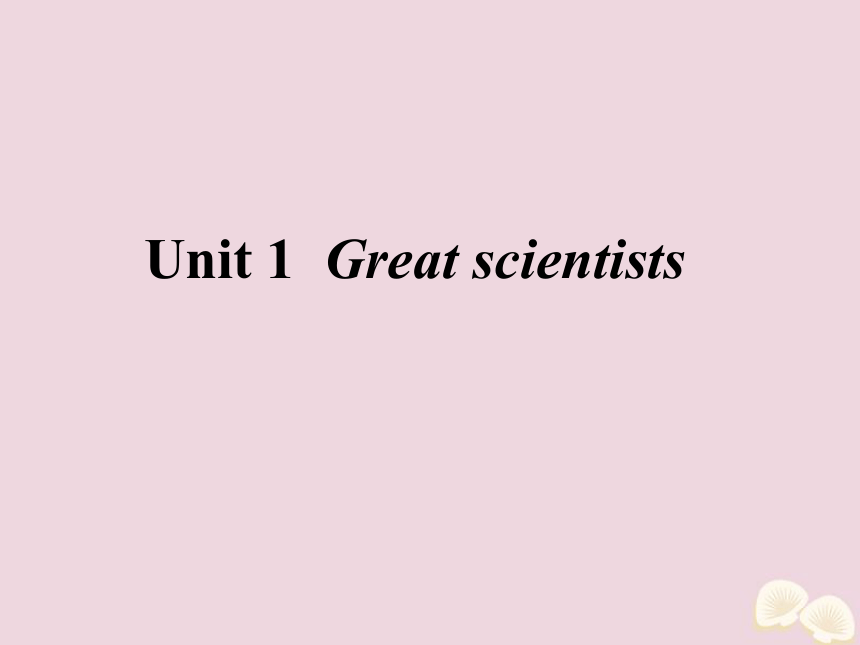 | |
| 格式 | zip | ||
| 文件大小 | 676.0KB | ||
| 资源类型 | 教案 | ||
| 版本资源 | 人教版(新课程标准) | ||
| 科目 | 英语 | ||
| 更新时间 | 2019-08-25 15:14:02 | ||
图片预览

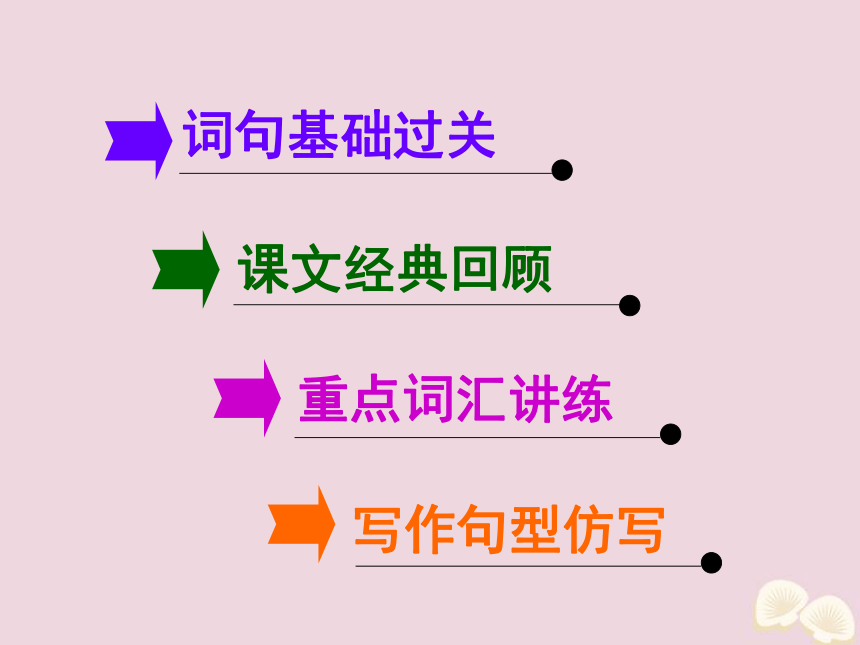

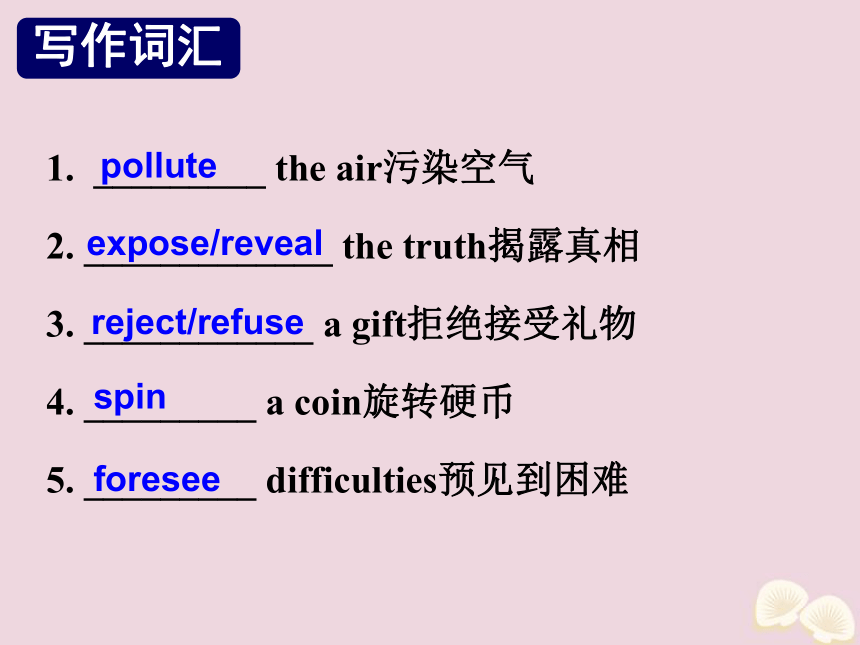
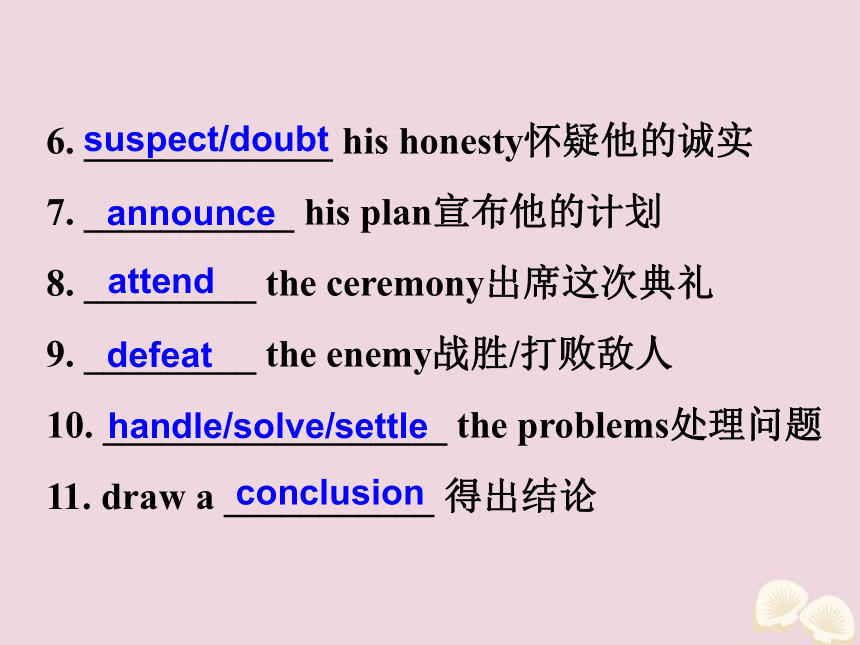
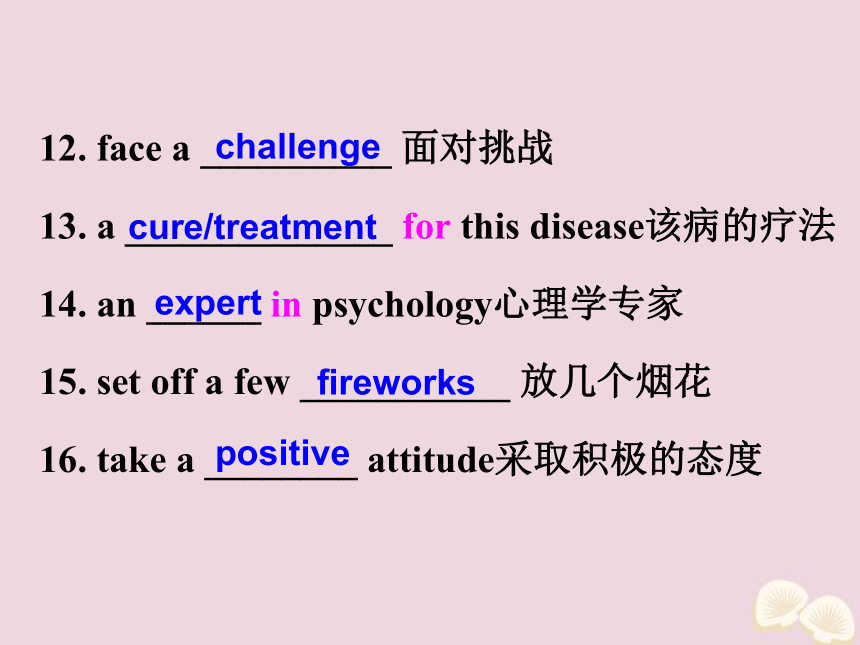
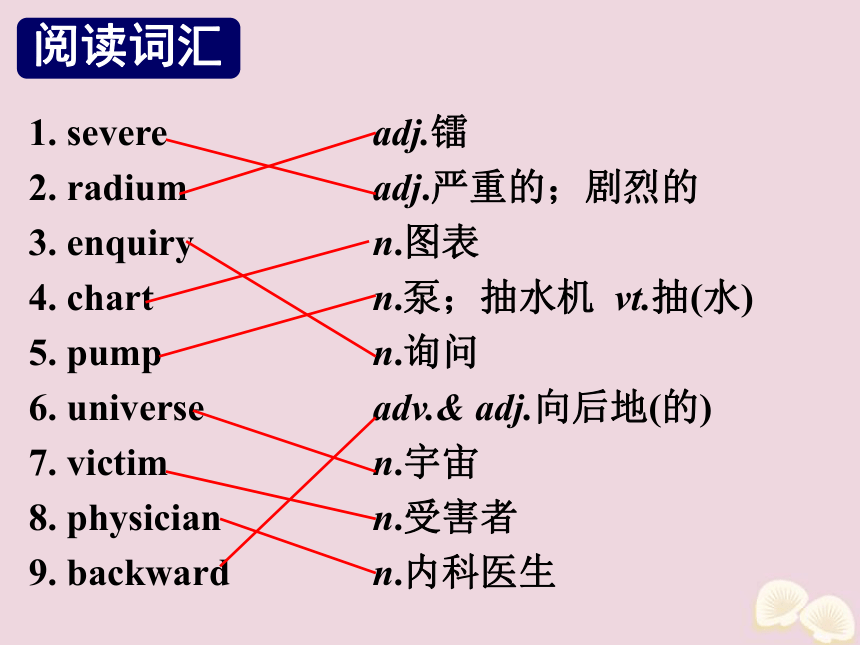
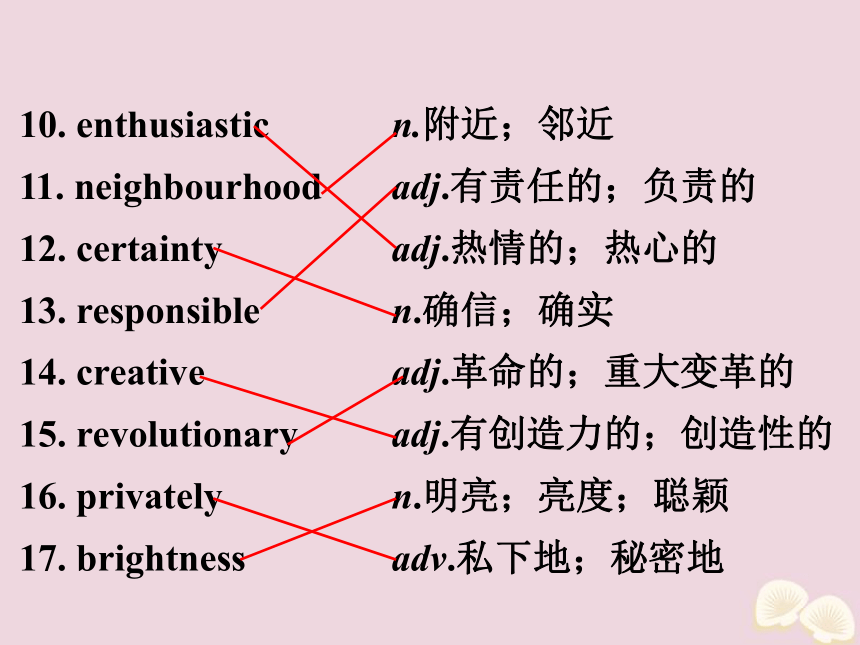
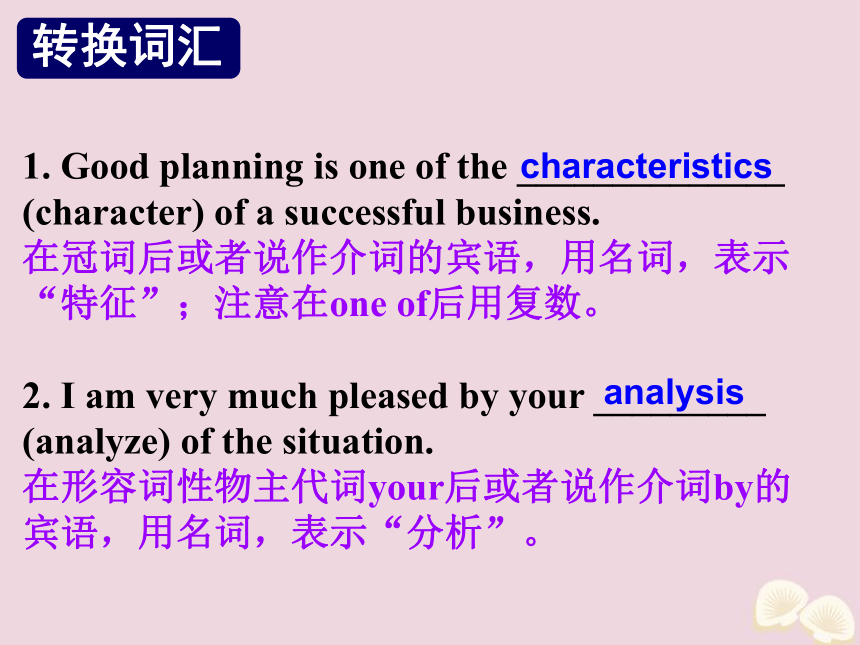
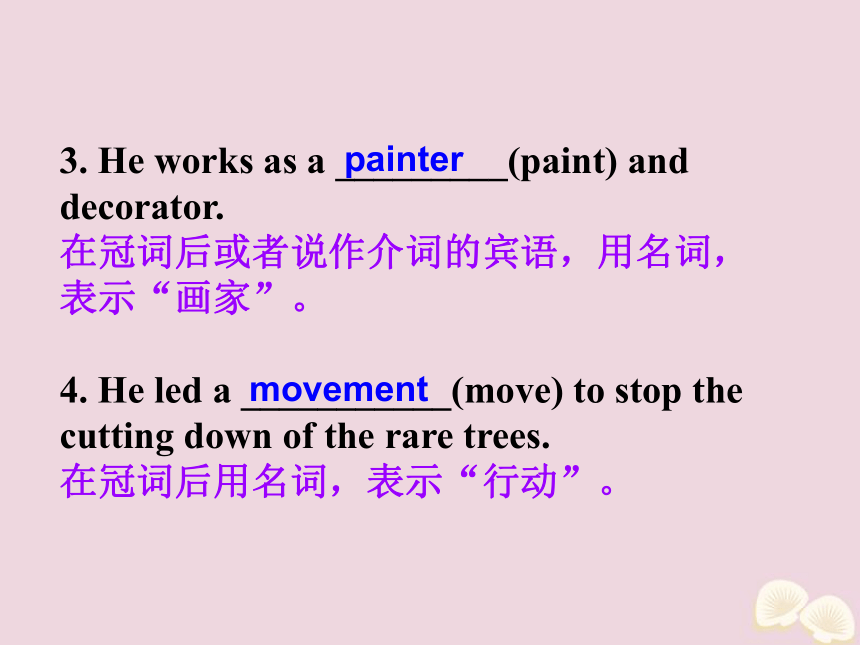
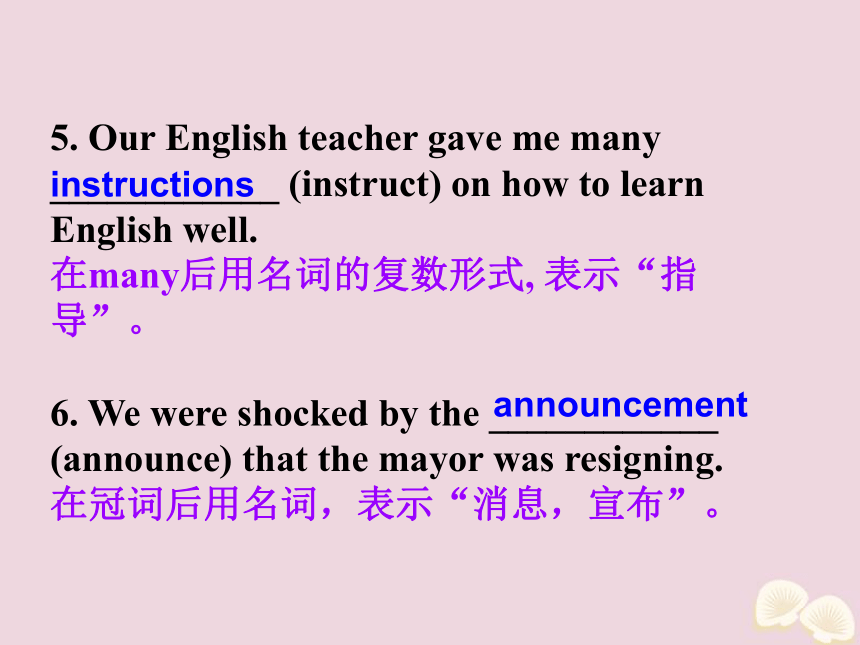
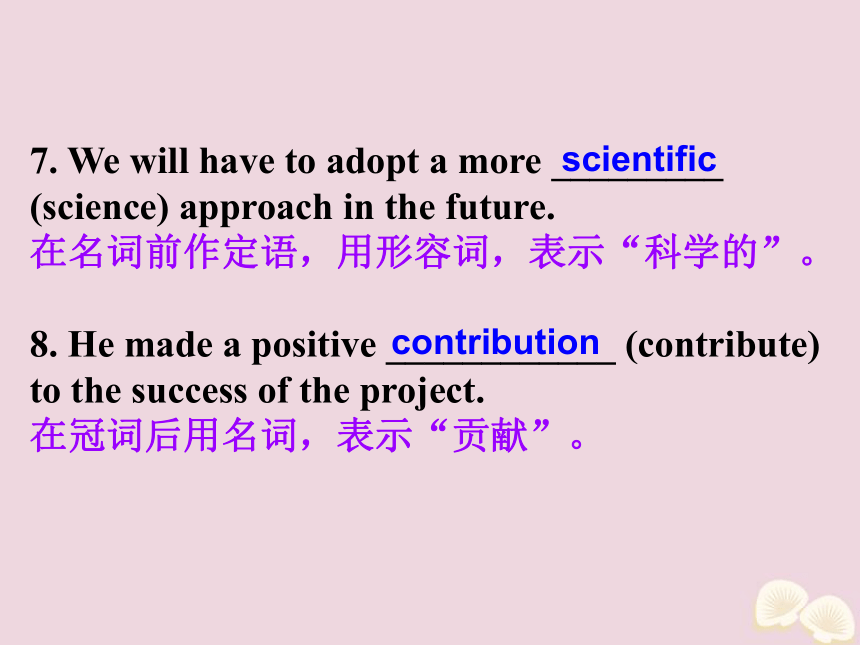
文档简介
(共52张PPT)
Unit 1 Great scientists
课文经典回顾
重点词汇讲练
写作句型仿写
词句基础过关
1. _________ the air污染空气
2. _____________ the truth揭露真相
3. ____________ a gift拒绝接受礼物
4. _________ a coin旋转硬币
5. _________ difficulties预见到困难
foresee
pollute
expose/reveal
reject/refuse
spin
6. _____________ his honesty怀疑他的诚实
7. ___________ his plan宣布他的计划
8. _________ the ceremony出席这次典礼
9. _________ the enemy战胜/打败敌人
10. __________________ the problems处理问题
11. draw a ___________ 得出结论
conclusion
suspect/doubt
announce
attend
defeat
handle/solve/settle
12. face a __________ 面对挑战
13. a ______________ for this disease该病的疗法
14. an ______ in psychology心理学专家
15. set off a few ___________ 放几个烟花
16. take a ________ attitude采取积极的态度
positive
challenge
cure/treatment
expert
fireworks
1. severe adj.镭
2. radium adj.严重的;剧烈的
3. enquiry n.图表
4. chart n.泵;抽水机 vt.抽(水)
5. pump n.询问
6. universe adv.& adj.向后地(的)
7. victim n.宇宙
8. physician n.受害者
9. backward n.内科医生
10. enthusiastic n.附近;邻近
11. neighbourhood adj.有责任的;负责的
12. certainty adj.热情的;热心的
13. responsible n.确信;确实
14. creative adj.革命的;重大变革的
15. revolutionary adj.有创造力的;创造性的
16. privately n.明亮;亮度;聪颖
17. brightness adv.私下地;秘密地
1. Good planning is one of the ______________ (character) of a successful business.
在冠词后或者说作介词的宾语,用名词,表示“特征”;注意在one of后用复数。
2. I am very much pleased by your _________ (analyze) of the situation.
在形容词性物主代词your后或者说作介词by的宾语,用名词,表示“分析”。
characteristics
analysis
3. He works as a _________(paint) and decorator.
在冠词后或者说作介词的宾语,用名词,表示“画家”。
4. He led a ___________(move) to stop the cutting down of the rare trees.
在冠词后用名词,表示“行动”。
painter
movement
5. Our English teacher gave me many ____________ (instruct) on how to learn English well.
在many后用名词的复数形式, 表示“指导”。
6. We were shocked by the ____________ (announce) that the mayor was resigning.
在冠词后用名词,表示“消息,宣布”。
announcement
instructions
7. We will have to adopt a more _________ (science) approach in the future.
在名词前作定语,用形容词,表示“科学的”。
8. He made a positive ____________ (contribute) to the success of the project.
在冠词后用名词,表示“贡献”。
scientific
contribution
9. Stricter controls on air _________ (pollute) would help to reduce acid rain.
在介词on后作宾语用名词,表示“污染”。
10. There are several underground lines under ____________ (construct) in Guangzhou.
在介词后用名词, under construction在建设中。
pollution
construction
1. ____________ a suggestion提出建议
2. _______________讲不通;没意义
3. ____________(=except for/in addition to)
只是;除外
4. _______________结束;完结
5. be to blame ____ the accident对事故负责
6. be strict _____ us对我们严格要求
with
put forward
make no sense
apart from
come to an end
for
7. be exposed ___ the air暴露在空气中
8. be absorbed ___ the work专注于工作
9. be cautious _______ doing sth做某事谨慎
10. contribute $5 ___ the fund向基金捐赠5美元
11. link smoking _________ cancer把吸烟同癌症
联系起来
to/with
to
in
about
(对比: be cautious of提防)
to
1. A woman, who had moved away from Broad Street, liked the water from the pump so much that she had it __________(deliver) to her house every day. 有一位妇女是从宽街搬过来的,她特别喜欢那里的水,每天都要派人从水泵打水运到家里来。
delivered
2. To prevent this from happening again, John Snow suggested that the source of all the water supplies _____________________(examine). 为了防止这种情况再度发生,约翰·斯洛建议所有水源都要经过检测。
3. Neither its cause nor its cure ______(be) understood. 人们既不知道它的病源,也不了解它的治疗方法。
(should) be examined
was
4. Only ____you put the sun there did the movements of the other planets in the sky
make sense. 只有你把太阳放在中心位置
上,天空中其他行星的运动才说得清楚。
5. He placed a fixed sun at the centre of the
solar system with the planets going round it
and only the moon still _______(go) round the
earth.他把太阳固定在太阳系的中心位置上,
而行星则围绕太阳转,只有月球仍围绕地球转。
going
if
John Snow, a well-known doctor in London, became 1 _________(inspire) when he thought about helping ordinary people who 2 _________ ________(expose) to cholera, a 3 ________(dead) disease of its day. Many thousands of people died 4 ________________there was an outbreak because no one knew the cause of it. John wanted to help solve the problem. He got interested in two theories 5 __________ (explain) how cholera killed people.
inspired
were
deadly
when/whenever
explaining
exposed
He believed in the second theory 6 _______ suggested that people 7 _________(absorb) the disease with their meals. In 1854, when another outbreak hit London, he was ready to test the two 8 _________(theory). 9 ______the help
of the map he made, he got a valuable clue
about the cause of the disease and was able to announce that the water was 10 _________ (blame).
to blame
that
absorbed
theories
With
John Snow is a famous doctor in London
—so expert, indeed, that he attended Queen Victoria for her personal physician. But he
became inspiring when he thought about help
ordinary people exposed to cholera. This was the deadly disease of their day.
Neither its cause or its cure was understood. So
many thousand of terrified people died every
time there was the outbreak. John Snow wanted
to face the challenge and to solve this problem. He knew that cholera would never be controlled until its cause found.
1. is→ was 据上下文可知是一般过去时,描述过去发生的事情。
2. for→ as 表示“作为”。
3. inspiring→ inspired 指人“感觉振奋的”,用inspired,而不能用inspiring (令人振奋的,激励人心的)。
4. help→ helping 在介词about后, 动词help要加上?ing。
5. their→ its 指代前面的“the deadly disease”,用单数。
6. or→ nor 因neither…nor… (既不……也不)是固定搭配。
7. thousand→ thousands 因这里thousands of
是非确切数,要加“s”。
8. the→ an 指“每次霍乱一爆发”,没有特指,无需用the,outbreak以元音开头,用an。
9. 去掉solve前面的to 因前半句已经有“to”了,故to无需重复。
10. 在found前加上was 被动语态,一般过去时,故在found前加上was。
Up till now, people have not found an effective cure for AIDS.到目前为止, 人们还没有找到治
疗艾滋病的有效的方法。
1.cure vt.治愈;矫正 n.治愈;疗法; 措施
cure sb of sth 治好某人的疾病、坏习惯等
a cure for… 治疗……的方法/药物
⑴ Her son was addicted to the computer
games and she had to ___________________
(使他改掉这个习惯).
⑵ The government is finding a cure _____
the severe pollution.
for
cure him of the habit
be absorbed in全神贯注于;专心致志于
2.absorb vt. 吸收;吸引(注意力)
Dark clothes absorb light easily. 深色衣服
容易吸收光线。
⑴ 当我进来时,他正聚精会神地看小说。
When I entered,he _____________________
a novel.
⑵ 我们可以从广泛的阅读中吸收许多有用的东西。
We can ___________________________ from extensive reading.
absorb a lot of useful things
was absorbed in reading
Who put forward a theory about black holes? 谁提出了关于黑洞的理论?
3. put forward 提出(建议);推荐;将……提前;将(钟表等)向前拨
put aside 储存;保留;把……放在一
边, 暂不考虑
put away 收起来放好;存(钱)
put off 延期;推迟
put out 熄灭;生产
put up 举起;张贴;建立;提供食宿
put up with 容忍;忍受
put down 放下;写下
(1) As for the problem you put forward in
your last letter, I think it is a wise choice for
you to buy an e-dictionary.
(2) I think he is fit for the position, therefore,
I’ll put him forward as a candidate.
写出下列句中put forward的含义。
推荐
提出
(3) Put your watch forward; it’s five minutes slow.
(4) They have put forward the date of their wedding by one week.
将……提前
拨快
(5) Mary is really good at taking notes in class. She can __________ almost every word her teacher says.
(6) Encourage children to _________ some of their pocket money to buy Christmas presents.
(7) I can ____________ the house being untidy, but I hate it if it’s not clean.
用put短语完成句子。
put up with
put down
put aside
make no sense 没道理;没意义
make sense of 了解……的意义;懂得
in a sense 在某一方面;就某种意义来说
common sense 常识
There is no sense in (doing) sth 做某事是没有意义的
4. make sense 有意义;有道理;讲得通
(1) It _____________to work on the problem before it gets out of control.
(2) Planning so far ahead _______________
—so many things will have changed by next year.
makes sense
makes no sense
(3) What she says is true ___________, but not always.
(4) Only after I read the poem a second time did I _______________ it.
make sense of
in a sense
blame sb for sth 为某事责备某人
5. be to blame (for sth)(为某事)应受责备/承
担责任
Mr Smith was to blame for the accident. 史密斯先生要为事故负责。
⑴ 我不怪你,我怪我自己。
I do not blame you,but I ______________.
⑵ 那次事故怪不得Tom,毕竟他还是个孩子。
Little Tom was not _________ for the accident. After all, he is only a child.
⑶ His mother blamed him ____his dishonesty.
blame myself
for
to blame
Apart from school work,I spend my spare time in singing and angling. 除了学校工作外,我把空余时间花在唱歌和钓鱼上。
6. apart from除了……之外
apart from是短语介词,既相当于besides/ in addition to/ as well as,又相当于except (for)。
⑴ Apart from the cost, time should also be
considered. ( )
⑵ Apart from a few mistakes,it is a good
composition. ( )
⑶ Apart from the ending,it’s really a good
film. ( )
用besides、except、except for替代apart from。
Except (Not including)
Besides (In addition to)
Except for
7. be strict with sb (in sth)(在某方面)对某人严格要求
You must be strict with yourself in study. 你在学习上要对自己严格要求。
⑴ Our English teacher is very strict ______
us ____our homework.
⑵ My mother is not only strict ____ her work but also strict _____ me.
with
with
in
in
You’d better have the machine repaired tomorrow. 你最好明天找人来修机器。
8. have sth done让某人干某事;遭遇某事
⑴ 明天我要去理发。
I will __________________________.
⑵ 爸爸几天前去拔牙。
My father ____________________ a
few days ago.
had his tooth pulled
have my hair cut tomorrow
The doctor suggested he have a good rest. 医生建议他要好好休息。
1. suggest (that) sb (should) do建议某人做某事
⑴ 他建议我们工作后要好好休息。
________________________________________ after work.
⑵ 她建议你去那里之前先打个电话。
___________________________________ before you go round there.
She suggested (that) you (should) phone
He suggested (that) we (should) have a good rest
⑴ 只有当你亲自来到伦敦,你才能体会到它的美。
Only if you are in London can you realize its beauty.
⑵ 只有当你用心学习时,你才能取得很大的进步。
Only when you put your heart into study ___________________________.
2. Only if+从句 只有当……(位于句首,主句倒装)
will you make great progress
I can’t fall asleep with the baby crying. 婴儿一直在哭,我睡不着觉。
3. with+宾语+非谓语动词
⑴ 鸟儿在唱歌,我们在森林里愉快地散步。
We walked happily in the forest ____________
________.
with the birds
singing
⑵ 还有很多作业要做,我今晚不能和你去看电影了。
___________________________,I can’t go to see the movie with you tonight.
⑶工作都做完了,我们出去打篮球了。
With all the work done, we went out to play basketball.
With a lot of homework to do
Unit 1 Great scientists
课文经典回顾
重点词汇讲练
写作句型仿写
词句基础过关
1. _________ the air污染空气
2. _____________ the truth揭露真相
3. ____________ a gift拒绝接受礼物
4. _________ a coin旋转硬币
5. _________ difficulties预见到困难
foresee
pollute
expose/reveal
reject/refuse
spin
6. _____________ his honesty怀疑他的诚实
7. ___________ his plan宣布他的计划
8. _________ the ceremony出席这次典礼
9. _________ the enemy战胜/打败敌人
10. __________________ the problems处理问题
11. draw a ___________ 得出结论
conclusion
suspect/doubt
announce
attend
defeat
handle/solve/settle
12. face a __________ 面对挑战
13. a ______________ for this disease该病的疗法
14. an ______ in psychology心理学专家
15. set off a few ___________ 放几个烟花
16. take a ________ attitude采取积极的态度
positive
challenge
cure/treatment
expert
fireworks
1. severe adj.镭
2. radium adj.严重的;剧烈的
3. enquiry n.图表
4. chart n.泵;抽水机 vt.抽(水)
5. pump n.询问
6. universe adv.& adj.向后地(的)
7. victim n.宇宙
8. physician n.受害者
9. backward n.内科医生
10. enthusiastic n.附近;邻近
11. neighbourhood adj.有责任的;负责的
12. certainty adj.热情的;热心的
13. responsible n.确信;确实
14. creative adj.革命的;重大变革的
15. revolutionary adj.有创造力的;创造性的
16. privately n.明亮;亮度;聪颖
17. brightness adv.私下地;秘密地
1. Good planning is one of the ______________ (character) of a successful business.
在冠词后或者说作介词的宾语,用名词,表示“特征”;注意在one of后用复数。
2. I am very much pleased by your _________ (analyze) of the situation.
在形容词性物主代词your后或者说作介词by的宾语,用名词,表示“分析”。
characteristics
analysis
3. He works as a _________(paint) and decorator.
在冠词后或者说作介词的宾语,用名词,表示“画家”。
4. He led a ___________(move) to stop the cutting down of the rare trees.
在冠词后用名词,表示“行动”。
painter
movement
5. Our English teacher gave me many ____________ (instruct) on how to learn English well.
在many后用名词的复数形式, 表示“指导”。
6. We were shocked by the ____________ (announce) that the mayor was resigning.
在冠词后用名词,表示“消息,宣布”。
announcement
instructions
7. We will have to adopt a more _________ (science) approach in the future.
在名词前作定语,用形容词,表示“科学的”。
8. He made a positive ____________ (contribute) to the success of the project.
在冠词后用名词,表示“贡献”。
scientific
contribution
9. Stricter controls on air _________ (pollute) would help to reduce acid rain.
在介词on后作宾语用名词,表示“污染”。
10. There are several underground lines under ____________ (construct) in Guangzhou.
在介词后用名词, under construction在建设中。
pollution
construction
1. ____________ a suggestion提出建议
2. _______________讲不通;没意义
3. ____________(=except for/in addition to)
只是;除外
4. _______________结束;完结
5. be to blame ____ the accident对事故负责
6. be strict _____ us对我们严格要求
with
put forward
make no sense
apart from
come to an end
for
7. be exposed ___ the air暴露在空气中
8. be absorbed ___ the work专注于工作
9. be cautious _______ doing sth做某事谨慎
10. contribute $5 ___ the fund向基金捐赠5美元
11. link smoking _________ cancer把吸烟同癌症
联系起来
to/with
to
in
about
(对比: be cautious of提防)
to
1. A woman, who had moved away from Broad Street, liked the water from the pump so much that she had it __________(deliver) to her house every day. 有一位妇女是从宽街搬过来的,她特别喜欢那里的水,每天都要派人从水泵打水运到家里来。
delivered
2. To prevent this from happening again, John Snow suggested that the source of all the water supplies _____________________(examine). 为了防止这种情况再度发生,约翰·斯洛建议所有水源都要经过检测。
3. Neither its cause nor its cure ______(be) understood. 人们既不知道它的病源,也不了解它的治疗方法。
(should) be examined
was
4. Only ____you put the sun there did the movements of the other planets in the sky
make sense. 只有你把太阳放在中心位置
上,天空中其他行星的运动才说得清楚。
5. He placed a fixed sun at the centre of the
solar system with the planets going round it
and only the moon still _______(go) round the
earth.他把太阳固定在太阳系的中心位置上,
而行星则围绕太阳转,只有月球仍围绕地球转。
going
if
John Snow, a well-known doctor in London, became 1 _________(inspire) when he thought about helping ordinary people who 2 _________ ________(expose) to cholera, a 3 ________(dead) disease of its day. Many thousands of people died 4 ________________there was an outbreak because no one knew the cause of it. John wanted to help solve the problem. He got interested in two theories 5 __________ (explain) how cholera killed people.
inspired
were
deadly
when/whenever
explaining
exposed
He believed in the second theory 6 _______ suggested that people 7 _________(absorb) the disease with their meals. In 1854, when another outbreak hit London, he was ready to test the two 8 _________(theory). 9 ______the help
of the map he made, he got a valuable clue
about the cause of the disease and was able to announce that the water was 10 _________ (blame).
to blame
that
absorbed
theories
With
John Snow is a famous doctor in London
—so expert, indeed, that he attended Queen Victoria for her personal physician. But he
became inspiring when he thought about help
ordinary people exposed to cholera. This was the deadly disease of their day.
Neither its cause or its cure was understood. So
many thousand of terrified people died every
time there was the outbreak. John Snow wanted
to face the challenge and to solve this problem. He knew that cholera would never be controlled until its cause found.
1. is→ was 据上下文可知是一般过去时,描述过去发生的事情。
2. for→ as 表示“作为”。
3. inspiring→ inspired 指人“感觉振奋的”,用inspired,而不能用inspiring (令人振奋的,激励人心的)。
4. help→ helping 在介词about后, 动词help要加上?ing。
5. their→ its 指代前面的“the deadly disease”,用单数。
6. or→ nor 因neither…nor… (既不……也不)是固定搭配。
7. thousand→ thousands 因这里thousands of
是非确切数,要加“s”。
8. the→ an 指“每次霍乱一爆发”,没有特指,无需用the,outbreak以元音开头,用an。
9. 去掉solve前面的to 因前半句已经有“to”了,故to无需重复。
10. 在found前加上was 被动语态,一般过去时,故在found前加上was。
Up till now, people have not found an effective cure for AIDS.到目前为止, 人们还没有找到治
疗艾滋病的有效的方法。
1.cure vt.治愈;矫正 n.治愈;疗法; 措施
cure sb of sth 治好某人的疾病、坏习惯等
a cure for… 治疗……的方法/药物
⑴ Her son was addicted to the computer
games and she had to ___________________
(使他改掉这个习惯).
⑵ The government is finding a cure _____
the severe pollution.
for
cure him of the habit
be absorbed in全神贯注于;专心致志于
2.absorb vt. 吸收;吸引(注意力)
Dark clothes absorb light easily. 深色衣服
容易吸收光线。
⑴ 当我进来时,他正聚精会神地看小说。
When I entered,he _____________________
a novel.
⑵ 我们可以从广泛的阅读中吸收许多有用的东西。
We can ___________________________ from extensive reading.
absorb a lot of useful things
was absorbed in reading
Who put forward a theory about black holes? 谁提出了关于黑洞的理论?
3. put forward 提出(建议);推荐;将……提前;将(钟表等)向前拨
put aside 储存;保留;把……放在一
边, 暂不考虑
put away 收起来放好;存(钱)
put off 延期;推迟
put out 熄灭;生产
put up 举起;张贴;建立;提供食宿
put up with 容忍;忍受
put down 放下;写下
(1) As for the problem you put forward in
your last letter, I think it is a wise choice for
you to buy an e-dictionary.
(2) I think he is fit for the position, therefore,
I’ll put him forward as a candidate.
写出下列句中put forward的含义。
推荐
提出
(3) Put your watch forward; it’s five minutes slow.
(4) They have put forward the date of their wedding by one week.
将……提前
拨快
(5) Mary is really good at taking notes in class. She can __________ almost every word her teacher says.
(6) Encourage children to _________ some of their pocket money to buy Christmas presents.
(7) I can ____________ the house being untidy, but I hate it if it’s not clean.
用put短语完成句子。
put up with
put down
put aside
make no sense 没道理;没意义
make sense of 了解……的意义;懂得
in a sense 在某一方面;就某种意义来说
common sense 常识
There is no sense in (doing) sth 做某事是没有意义的
4. make sense 有意义;有道理;讲得通
(1) It _____________to work on the problem before it gets out of control.
(2) Planning so far ahead _______________
—so many things will have changed by next year.
makes sense
makes no sense
(3) What she says is true ___________, but not always.
(4) Only after I read the poem a second time did I _______________ it.
make sense of
in a sense
blame sb for sth 为某事责备某人
5. be to blame (for sth)(为某事)应受责备/承
担责任
Mr Smith was to blame for the accident. 史密斯先生要为事故负责。
⑴ 我不怪你,我怪我自己。
I do not blame you,but I ______________.
⑵ 那次事故怪不得Tom,毕竟他还是个孩子。
Little Tom was not _________ for the accident. After all, he is only a child.
⑶ His mother blamed him ____his dishonesty.
blame myself
for
to blame
Apart from school work,I spend my spare time in singing and angling. 除了学校工作外,我把空余时间花在唱歌和钓鱼上。
6. apart from除了……之外
apart from是短语介词,既相当于besides/ in addition to/ as well as,又相当于except (for)。
⑴ Apart from the cost, time should also be
considered. ( )
⑵ Apart from a few mistakes,it is a good
composition. ( )
⑶ Apart from the ending,it’s really a good
film. ( )
用besides、except、except for替代apart from。
Except (Not including)
Besides (In addition to)
Except for
7. be strict with sb (in sth)(在某方面)对某人严格要求
You must be strict with yourself in study. 你在学习上要对自己严格要求。
⑴ Our English teacher is very strict ______
us ____our homework.
⑵ My mother is not only strict ____ her work but also strict _____ me.
with
with
in
in
You’d better have the machine repaired tomorrow. 你最好明天找人来修机器。
8. have sth done让某人干某事;遭遇某事
⑴ 明天我要去理发。
I will __________________________.
⑵ 爸爸几天前去拔牙。
My father ____________________ a
few days ago.
had his tooth pulled
have my hair cut tomorrow
The doctor suggested he have a good rest. 医生建议他要好好休息。
1. suggest (that) sb (should) do建议某人做某事
⑴ 他建议我们工作后要好好休息。
________________________________________ after work.
⑵ 她建议你去那里之前先打个电话。
___________________________________ before you go round there.
She suggested (that) you (should) phone
He suggested (that) we (should) have a good rest
⑴ 只有当你亲自来到伦敦,你才能体会到它的美。
Only if you are in London can you realize its beauty.
⑵ 只有当你用心学习时,你才能取得很大的进步。
Only when you put your heart into study ___________________________.
2. Only if+从句 只有当……(位于句首,主句倒装)
will you make great progress
I can’t fall asleep with the baby crying. 婴儿一直在哭,我睡不着觉。
3. with+宾语+非谓语动词
⑴ 鸟儿在唱歌,我们在森林里愉快地散步。
We walked happily in the forest ____________
________.
with the birds
singing
⑵ 还有很多作业要做,我今晚不能和你去看电影了。
___________________________,I can’t go to see the movie with you tonight.
⑶工作都做完了,我们出去打篮球了。
With all the work done, we went out to play basketball.
With a lot of homework to do
